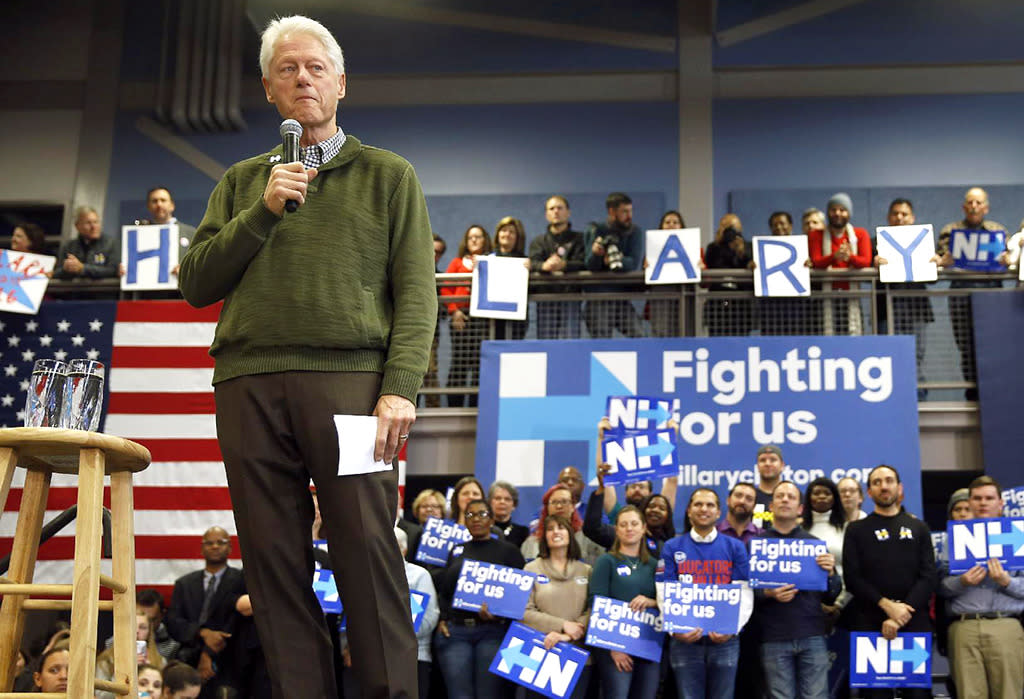Bill Clinton pushes back against ‘establishment’ as a slur

Bill Clinton speaks at a campaign stop for Hillary Clinton at Manchester Community College in Manchester, N.H., on Feb. 8, 2016. (Photo: Matt Rourke/AP)
MANCHESTER, N.H. — The handbill on a table outside the rally said, “I’m a progressive. And I want to get things done. #ImWithHer” under a picture of Hillary Clinton.
But in remarks at a Clinton rally here Monday, former Pres. Bill Clinton owned his background as a Southern centrist and took pains to remind his wife’s supporters that not all of America looks like progressive New England.
“It bothers me to be in an election where debate is impossible because if you disagree you’re just part of the establishment,” Clinton said. It was a reference to Hillary Clinton’s Democratic presidential primary opponent Bernie Sanders, who has cast himself as a fighter against “the political establishment.”
He cited a list of politicians who back Hillary Clinton — including New Hampshire Gov. Maggie Hassan and Sen. Jeanne Shaheen, both of whom appeared at the rally and spoke on her behalf — as people he doesn’t consider “establishment politicians.”
A number of Arkansans were also in the audience, and Clinton singled one man from his home state out: “Our immediate past senator Mark Pryor, who was defeated in a landslide in 2014 in large measure because he voted for a healthcare bill.
“That doesn’t strike me as establishment,” Clinton continued. “And nobody alive in my state thinks he lost because people thought he wasn’t liberal enough.”
Pryor was defeated by Tom Cotton, a tea party-backed candidate, who beat him by nearly 20 points after Pryor ran an ad defending President Obama’s health insurance overhaul.
Slideshow: The battle for New Hampshire >>>
“She’s the best change-maker I’ve ever known,” Bill Clinton said about his wife, adding, in a nod to her ability to get things through Congress, “… Just about everything she did had Republican support.”
When it came to health care reform, the Clinton administration failed in 1993 because “we just didn’t have 60 votes in the Senate,” the former president said.
“There hasn’t been a single change in the health care in 60 years plus, since Harry Truman tried to get universal health care, that hasn’t had 60 votes in the Senate to break the Republican filibuster,” Clinton continued. But the S-CHIP program backed by Hillary Clinton won with the support of Republicans, he said. The smaller, bipartisan approach to legislating made progress, with GOP support, where the big Clinton bill failed.
“We can’t get in a place where we’re so mad that we demonize anybody who’s against us, where we can’t have any honest discussion about who’s got a better health care reform [plan], where everybody that’s on the other side is part of some mythical establishment, including people like Planned Parenthood and the Human Rights Campaign fund,” Bill Clinton said. “We can’t do that.”
Hillary Clinton’s speech that followed ranged over a wide array of topics but also argued strongly against Sanders’ proposed single-payer health coverage plan.
“We got a bipartisan coalition in the House and the Senate and we passed it,” Clinton said of S-CHIP. “It wasn’t everything we wanted, but I often think of that old saying, you know, a person who refuses a half a loaf because it’s not a whole loaf has never gone hungry.”
She said that the goal now had to be to build on the Affordable Care Act and defend it against Republican efforts to repeal it.
“What we cannot do is start over. We cannot take what looks good on paper, an idea and say, you know what, we’re going to thrust our nation into a contentious debate and start all over. It’s a lot easier to get from 90 percent coverage to 100, than it is to get from zero to 100.”
Republicans currently hold majorities in both the House and Senate. They also are defending more seats than Democrats in the 2016 Senate races, but if the Democrats can’t flip five seats to retake the Senate, an incoming Democratic president would take office with little congressional support than either Bill Clinton or Barack Obama enjoyed in their first two years. Both had a Democratic House and Senate to work with in their early years. The House is considered safe for the Republicans in anything short of a Democratic landslide.
Sanders says he would mobilize Americans for a political revolution to pressure a Republican Congress to pass his progressive agenda. Clinton, by contrast, promises to find common ground with Republicans on areas such as infrastructure investment that would, she said, act as a “jobs program.”
(Cover tile photo: Brian Snyder/Reuters)


